Looking for creative ways to keep your preschooler engaged while helping them learn? We’ve rounded up 56 fun-filled preschool activities that strike the perfect balance between play and education. From simple arts and crafts to hands-on science experiments and outdoor games, these activities are designed to spark curiosity, build essential skills, and bring lots of smiles. Whether you’re a parent at home or a teacher in the classroom, you’ll find exciting ideas to make every day a new adventure in learning
Allow your child to grow as they explore these developmental stages with KLAY Preschools!
Types of Activities in Preschools
While preschool activities are meant to be fun, the end goal is to help a child grow. Since traditional lessons can be daunting for young preschoolers, activities and classroom games are the ultimate choice to add fun to learning.
Here is a list of activities that can help develop their skill set:
Cognitive Development Activities
Cognitive activities for preschoolers help sharpen their thinking, memory, and decision-making skills. They are essential because they encourage preschoolers to observe, analyse, and respond to their surroundings. From memory games to puzzles, these playful exercises make learning fun and impactful.

Memory Games:
Memory games are a great way to boost concentration and recall.
- Card Matching Games: In this game, the child has to flip cards and find matching pairs. This is perfect for improving visual memory.
- What’s Missing: Display a group of items, then remove one and ask the child to spot what’s gone.
- Story Retelling: Let children narrate a story they’ve heard, using pictures or questions to prompt their memory.
Problem-Solving Activities:
These activities build logical thinking and patience, while also encouraging children to try different solutions until they succeed.
- Jigsaw Puzzles: Jigsaw puzzles are a fun way to enhance a child’s spatial awareness and critical thinking.
- Sorting Games: In this activity, you can ask children to group items by shape, colour, or size. This is great for introducing basic classification skills.
- Matching Games: Use picture cards or objects that go together to help kids recognise patterns and relationships.
STEM-Based Activities
STEM-based activities introduce young minds to the world of science, technology, engineering, and maths in a hands-on, age-appropriate way. These activities are important because they help preschoolers develop critical thinking, observation, and early analytical skills. Whether it’s counting toys or experimenting with colours, these playful experiences make complex ideas simple and fun.

Math Activities:
Math activities for preschoolers help them understand numbers, patterns, and shapes in everyday life, laying the foundation for stronger numerical skills.
- Counting Objects: Encourage children to count toys, blocks, or snacks to build number sense.
- Shape Sorting: Let them match objects to shape cutouts. This shape activity for preschoolers is great for recognising basic geometric forms.
- Building Towers with Numbered Blocks: This number activity for preschoolers allows them to naturally learn the number order and sequencing by stacking and building towers.
Science Activities:
Science activities spark curiosity and help children explore how the world works through simple, hands-on experiments.
- Colour Mixing: Mix water and food colouring to teach how primary colours create new ones.
- Plant Growth Experiment: Watch seeds grow in a clear jar. With this activity, kids begin understanding nature and changes over time.
- Melting Ice Experiment: Observe how ice melts faster in warm water than cold, introducing basic concepts of temperature and states of matter.
Physical Development Activities
Physical development activities are all about helping preschoolers grow stronger, more coordinated, and more confident in how they move. These exercises are essential because they support everything from muscle strength and balance to fine control needed for writing or self-care tasks.

From fine motor tasks like bead threading to gross motor games like obstacle courses, these physical activities for preschoolers are both fun and foundational.
Fine Motor Skills Activities:
Fine motor activities help children develop control in their hands and fingers. These are the skills needed for everyday tasks like writing, buttoning clothes, or feeding themselves.
- Playdough Activities: Squishing and shaping playdough builds hand strength and sparks creativity.
- Bead Threading: Sliding beads onto strings sharpens focus and hand-eye coordination.
- Cutting with Child-Safe Scissors: Encourages precision and strengthens finger muscles.
- Using Tweezers or Tongs: Picking up small objects boosts dexterity and grip control.
Gross Motor Skills Activities:
Gross motor activities support whole-body movements, helping preschoolers build balance, strength, and spatial awareness.
- Obstacle Courses: Crawling through tunnels and jumping over objects enhances coordination and agility.
- Jump Rope: A great way to improve rhythm, balance, and heart health.
- Dancing and Movement Games: Games like freeze dance make movement fun while building motor control.
- Catching and Running Games: Activities like tag or rolling a ball help with reaction time and overall fitness.
Social and Emotional Development Activities
Social and emotional development activities help children learn how to understand their feelings, express them appropriately, and build healthy relationships with others. These skills are vital because they shape how preschoolers interact, share, cooperate, and handle challenges. Through pretend play, group tasks, and storytelling, your little one is given the tools to thrive both emotionally and socially.

Role-Playing Games:
Role-playing games give children a safe space to explore emotions, practice empathy, and develop communication skills.
- Pretend Play: Using toys like dollhouses or play kitchens helps kids act out real-life situations and understand different roles.
- Dress-Up Games: Playing as doctors, teachers, or firefighters encourages imagination and empathy.
- Puppet Shows: A fun way for children to express emotions and build confidence in storytelling.
Group Activities:
Group activities teach cooperation, patience, and how to work with others, which are important life skills that need to be taught early in life.
- Cooperative Block Building: Children learn to share ideas and work together towards a common goal.
- Group Storytelling: Taking turns to add to a story builds creativity and encourages listening.
- Board Games with Simple Rules: Great for practising turn-taking, handling wins and losses, and following instructions.
Creative Development Activities
Creative development activities nurture a child’s imagination, help them express themselves freely, and support cognitive skills and emotional growth. They are important because these activities encourage exploration, build confidence, and help children make sense of the world in their unique way.

Whether it’s splashing colours or dancing to music, art activities for preschoolers, craft activities for preschoolers, and finger painting activities for preschoolers are a joyful way to learn through play.
Art and Craft Activities:
Art and craft projects allow children to express their ideas visually while also improving fine motor skills and focus.
- Finger Painting and Handprint Art: A sensory-rich way to spark creativity and self-expression.
- Collage-Making: Using magazine clippings or natural materials like leaves encourages decision-making and design skills.
- DIY Crafts: Activities like making paper hats or animal masks help children follow steps and explore textures.
Music and Movement Activities:
These activities combine rhythm, sound, and motion to develop coordination, listening, and early musical awareness.
- Singing Nursery Rhymes with Actions: Helps children remember words while practising movement and rhythm.
- Playing Musical Instruments: Simple tools like shakers or xylophones introduce beat and sound patterns.
- Freeze Dance: A fun way to build self-control and respond to auditory cues through movement.
Sensory Play Activities
Sensory play is all about engaging a child’s senses, like touch, sound, smell, sight, to support brain development and encourage exploration. These activities are essential because they help children make sense of their environment, build nerve connections, and improve focus and motor skills. Whether it is squishing goop or matching sounds, sensory activities for kids make learning rich and hands-on.
Tactile Exploration:
Tactile sensory play gives children the chance to explore textures and temperatures, supporting both curiosity and fine motor development.
- Making Goop: This delightfully messy mix shifts between solid and liquid, offering a fun sensory challenge.
- Frozen Treasure Hunt: Freeze small toys in ice and let kids melt or chip them out. This enhances the child’s problem-solving skills and touch exploration.
Sound and Smell Activities:
These activities engage children’s hearing and sense of smell, helping them tune into their environment and build sensory awareness.
- Sound Matching: Fill plastic eggs with different items and let kids shake and match by sound. With this activity, kids can work on their auditory discrimination skills.
- Scented Playdough: Add cinnamon, lavender, or lemon to playdough to make it a calming and scented sensory treat.
Visual Sensory Activities:
Visual activities boost observation skills and introduce children to colour, light, and movement in exciting ways.
- Light Table Play: Let kids trace shapes, sort see-through objects, and play with shadows and light.
- Colour Mixing with Ice Cubes: Watch primary-coloured ice cubes melt and blend. With this sensory play activity, kids work on developing visual stimulation and early science learning.
Outdoor and Nature Activities
Outdoor and nature activities give children a chance to explore the world around them while staying active and curious. These experiences are important because they support physical health, creativity, and a deeper connection with nature. From scavenger hunts to ball games, outdoor activities for preschoolers are a great way to blend learning with fresh air and fun.
Nature Exploration Activities:
Nature-based activities help children notice details, ask questions, and build a sense of wonder about the environment.
- Collecting Natural Objects: Encourage children to gather leaves, rocks, or flowers. This activity of collecting natural objects is perfect for learning shapes, textures, and colours.
- Observing Wildlife: Spot birds, insects, or even cloud shapes to spark curiosity and observation skills.
- Treasure Hunts: Use simple clues to guide children in finding objects outdoors, building attention and problem-solving.
Outdoor Physical Play:
Outdoor physical play keeps children active while supporting coordination, balance, and social skills.
- Hopscotch: Helps children practise number recognition while developing balance and motor skills.
- Ball Games: Rolling, catching, or dribbling boosts hand-eye coordination and teamwork.
- Tug-of-War: A fun way to build physical strength and learn about working together.
Language Development Activities
Language development activities help preschoolers build strong communication skills, from understanding words to expressing their thoughts clearly. These activities are crucial because they support vocabulary growth, phonemic awareness, and early literacy. Through storytelling, rhyming games, and hands-on letter activities, children develop their listening skills and a love for language. Language activities like reading books or playing “I Spy” make learning fun and interactive.
Story-Based Play:
Story-based activities spark imagination while building vocabulary and improving listening skills.
- Reading Picture Books: Introduces new words and helps children connect language to visuals.
- Story Sequencing Cards: Encourages logical thinking and helps kids understand story structure.
- Role-Play Storytelling: This activity lets children act out stories, boosting creativity and communication confidence.
Phonemic Activities:
These activities help children recognise and play with the sounds in words, which are essential for early reading.
- “I Spy” with Sounds: A playful way to practise initial letter sounds in everyday settings.
- Rhyming Word Games: Matching rhyming words helps children recognise sound patterns.
- Letter Tracing and Sand Writing: Involves tracing letters using fingers or sticks, which supports sensory learning and early writing development.
Seasonal and Holiday Activities
Seasonal and holiday activities add a festive touch to learning while helping children connect with the changes in nature and traditions around them. They are valuable because they keep learning fresh and relevant throughout the year. From crafting snowflakes to painting with apples, summer activities for kids and winter activities for kids can be both fun and educational when tied to the seasons.
Fall Activities:
Autumn brings a variety of textures, colours, and natural materials perfect for creative exploration.
- Apple Stamping: Cut apples in half, dip them in paint, and press them onto paper to create unique autumn prints.
- Pumpkin Sensory Bin: Let kids scoop out seeds and explore the inside of a pumpkin. This activity is great for sensory play and simple measurements.
Winter Activities:
Winter activities often involve cool textures and festive fun, encouraging creativity and fine motor development.
- Snowflake Symmetry Cutting: Folding and cutting paper snowflakes teaches symmetry and scissor skills.
- Ice Ornament Making: Freeze leaves or berries in water to create sparkling ornaments for outdoor trees.
Summer Activities:
Summer-themed activities celebrate new life and colours, helping children learn through hands-on exploration.
- Butterfly Life Cycle Craft: Use different pasta shapes to show each stage of a butterfly’s transformation.
- Rainbow Colour Mixing: Mix coloured water to learn how primary colours blend into new shades.
KLAY’s Foundational Development Program nurtures every part of your child’s growth with fun learning activities.
Importance of Preschool Activities
While these activities for preschoolers surely do the job of keeping a child’s brain active, they also play a key role in shaping their early development. Below, we have highlighted the importance of preschool activities:
Building Physical Strength and Coordination
From climbing frames to simple ball games, physical activities help children strengthen their muscles and improve balance. These moments of active play boost motor skills and overall fitness. It also lays the groundwork for healthy lifestyle habits.
Sharpening Thinking and Problem-Solving Skills
Activities like puzzles, sorting games, and storytelling encourage children to think, ask questions, and explore. This helps develop memory, attention span, and the ability to solve problems independently.
Learning to Interact and Share
Group play teaches children how to take turns, cooperate, and resolve small conflicts. These social skills are vital as they begin to form friendships and understand how to be part of a group. It builds confidence in interacting with others.
Developing Early Writing and Communication
Whether it is doodling or learning to hold a pencil, preschoolers begin expressing themselves through writing. Alongside this, they also learn to convey their thoughts and emotions verbally. This sets the stage for strong communication in later years.
Understanding and Managing Emotions
Through play and guided interaction, children start to recognise their own emotions and those of others. They learn how to express feelings in a healthy way and build empathy. This emotional awareness helps them handle situations calmly.
Boosting Vocabulary and Speaking Skills
Storytime, songs, and chatting with teachers all contribute to a child’s growing vocabulary. Regular exposure to language improves their ability to understand and express themselves.
How Can Parents Support Their Child’s Learning Beyond Activities in Preschool?
While your child is actively engaged during preschool hours, the role you play at home is just as important. Reinforcing preschool activities at home helps your child build confidence, strengthens what they learn in class, and creates a smoother transition between school and home.
Create a Steady Routine
Children feel more secure and settled when they know what to expect. A consistent routine not only supports their memory and focus but also encourages positive habits and self-discipline from an early age.
Talk About Their Day
Encourage your child to share what they did at school. Whether it’s an art project or a new song, talking about it helps them process their experiences, expand their vocabulary, and express themselves more confidently.
Stay Connected with Their Teachers
Make time for regular conversations with your child’s teachers. These check-ins help you understand your child’s progress, highlight any areas that need extra attention, and allow you to support their development more effectively at home.
How Preschools Shape Young Minds with Guided Play
Preschool activities do so much more than just keep children busy during the day. Every activity, from storytime to snack time, is designed to support a child’s all-around development. Preschool activities do more than keep children busy—they support all-around development. In well-organised spaces, kids explore, socialise, and learn through fun, theme-based activities that nurture emotional growth, creativity, and safety.
Discover how the right preschools expertly weave education into play, shaping the thinkers and leaders of tomorrow.
Exploring in a Structured Space
As mentioned earlier, children thrive in environments where they know what to expect. Preschools offer just that – a well-organised, child-friendly space where little ones can explore freely. Predictable routines like morning circle time and free play provide comfort and consistency, helping children feel secure as they go about their day.
Socialising with Peers
Early childhood is a key time for developing social skills. In preschool, children take part in group activities, like reading together or acting out stories, which naturally encourage teamwork. Along the way, they also pick up vital life lessons like sharing, taking turns, and resolving conflicts peacefully.
Bringing Fun and Learning Together
Preschools are experts at blending learning with fun. Whether it’s counting pieces of fruit at snack time or expanding vocabulary during story sessions, every activity at the preschool is a chance to learn something new. Many are even built around themes like seasons or animals, helping children make connections between different subjects like science, maths, and art.
Nurturing Emotional Growth
Emotional growth is just as important as letters and numbers. Preschools create warm, welcoming spaces where kids feel encouraged to express themselves and build confidence. Tools like calming corners and simple mindfulness exercises help children learn to manage their emotions.
Building Strong Parent Partnerships
Kids are exposed to fun and easy activities in these centres. Even parents can try preschool activities at home, including activities like going on nature walks or making crafts with everyday items. Some schools even host parent workshops to show how play can be a powerful tool for learning.
Tracking Progress
Every child develops at their own pace, and preschools take care to monitor each one’s journey. Teachers use simple observation checklists to note growth in areas like language, motor skills, and social interactions. This helps them provide parents with helpful updates on their child’s strengths and areas they might need a little more support with.
Letting Creativity Bloom
These schools encourage children to express themselves freely, without focusing on perfect outcomes. Open-ended art projects and make-believe games allow imaginations to run wild. Proudly displaying children’s work around the classroom not only celebrates effort but also boosts self-worth.
Keeping Safety at Prime
Above all, preschools are committed to keeping little ones safe. From using non-toxic materials to ensuring scissors have rounded edges, every activity is planned with safety in mind. Children are also gently taught everyday safety habits, like how to handle materials properly and tidy up after themselves.
Making Learning Fun with KLAY Preschools!
At KLAY Preschools, learning isn’t confined to books or blackboards, it is woven into every story, game, and giggle. Our thoughtfully designed Foundational Development Program ensures that each child’s early years are filled with discovery, creativity, and joy. All of this in a safe and nurturing environment.
Whether it’s building social skills, exploring their curiosity, or simply having fun while learning, your little one is in expert hands.
Ready to give your child a joyful head start?
Explore KLAY’s Foundational Development Program and find a centre near you today!








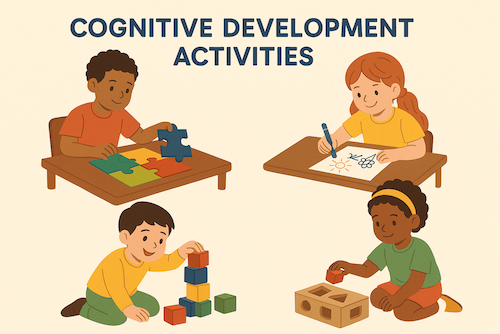
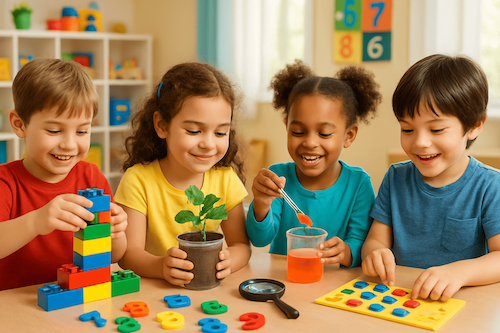
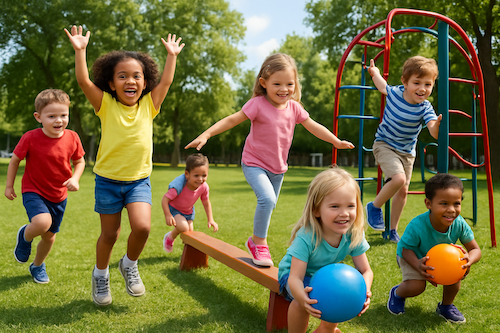
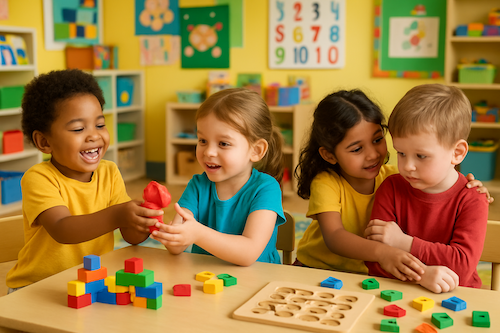
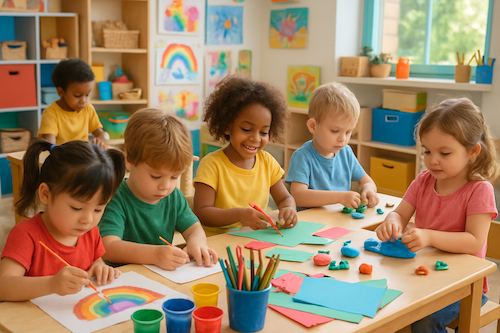








Subscribe to our newsletter
[contact-form-7 id="12706" title="Newsletter Form for post page"]Our Related Blogs
Yoga Benefits, Activities, and Poses for Preschoolers
For preschoolers, yoga isn’t about perfection but about giggles and benefits. So, are you curious how a simple stretch can support a child’s focus, flexibility, and emotional well-being? Let’s roll...
Year-End Reflection and Goal Setting for Children
Parenting is a journey filled with the brightest moments and valuable lessons, both for us and our children. As the year draws to a close, it’s the perfect time to...
Work-Life Balance Solutions for Parents in Emerald Hills Rd, Sector 65, Gurugram: The KLAY Daycare Advantage
Finding the perfect balance between professional commitments and parenting is a challenge for many working families in Gurugram. Parents in Emerald Hills Rd, Sector 65, especially, look for childcare solutions...